Barrons ccrn exam - Study guides, Class notes & Summaries
Looking for the best study guides, study notes and summaries about Barrons ccrn exam? On this page you'll find 62 study documents about Barrons ccrn exam.
Page 4 out of 62 results
Sort by
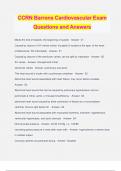
-
CCRN Barrons Cardiovascular Exam Questions and Answers
- Exam (elaborations) • 18 pages • 2024
- Available in package deal
-
- $12.49
- + learn more
CCRN Barrons Cardiovascular Exam Questions and Answers Marks the end of diastole, the beginning of systole - Answer- S1 Caused by closure of AV valves (mitral, tricuspid) & loudest at the apex of the heart (midclavicular, 5th intercostal) - Answer- S1 Caused by closure of the semilunar valves; can be split by inspiration - Answer- S2 AV valves - Answer- tricuspid and mitral semilunar valves - Answer- pulmonary and aortic This heart sound is louder with a pulmonary embolism - Answer- S2 ...
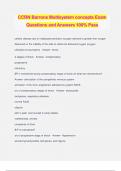
-
CCRN Barrons Multisystem concepts Exam Questions and Answers 100% Pass
- Exam (elaborations) • 7 pages • 2024
- Available in package deal
-
- $11.49
- + learn more
CCRN Barrons Multisystem concepts Exam Questions and Answers 100% Pass cellular disease due to inadequate perfusion (oxygen demand is greater than oxygen delivered) or the inability of the cells to utilize the delivered oxygen (oxygen utilization/consumption) - Answer- shock 3 stages of shock - Answer- compensatory progressive refractory BP is maintained during compensatory stage of shock d/t what two mechanisms? - Answer- stimulation of the sympathetic nervous system activation of the...
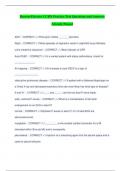
-
Barron's CCRN Exam Questions and Answers Already Passed
- Exam (elaborations) • 32 pages • 2024
-
- $12.99
- + learn more
"high dose" dopamine causes vasoconstriction and (C) Increase afterload - What is the primary hemodynamic effect of: Dopamine >10 mcg/kg/min (A) Increase preload (B) Decrease preload (C) Increase afterload (D) Decreased afterload (E) Increase contractility (D) Decrease contractility Pulmonary HTN and cor pulmonale; Mitral, aortic, or tricuspid insufficiency - What causes the S3 sound? during diastole - When are coronary arteries perfused? S3 heart sound - What may you hear befo...
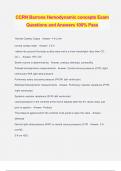
-
CCRN Barrons Hemodynamic concepts Exam Questions and Answers 100% Pass
- Exam (elaborations) • 6 pages • 2024
- Available in package deal
-
- $11.49
- + learn more
CCRN Barrons Hemodynamic concepts Exam Questions and Answers 100% Pass Normal Cardiac Output - Answer- 4-8 L/min normal cardiac index - Answer- 2.5-4 +takes into account the body surface area and is a more meaningful value than CO CO = - Answer- HR x SV Stroke volume is determined by - Answer- preload, afterload, contractility Preload hemodynamic measurements - Answer- Central venous pressure (CVP) (right ventricular) AKA right atria pressure Pulmonary artery occlusive pressure (PAOP) (...
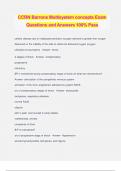
-
CCRN Barrons Multisystem concepts Exam Questions and Answers 100% Pass
- Exam (elaborations) • 7 pages • 2024
- Available in package deal
-
- $11.49
- + learn more
CCRN Barrons Multisystem concepts Exam Questions and Answers 100% Pass cellular disease due to inadequate perfusion (oxygen demand is greater than oxygen delivered) or the inability of the cells to utilize the delivered oxygen (oxygen utilization/consumption) - Answer- shock 3 stages of shock - Answer- compensatory progressive refractory BP is maintained during compensatory stage of shock d/t what two mechanisms? - Answer- stimulation of the sympathetic nervous system activation of the...
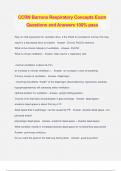
-
CCRN Barrons Respiratory Concepts Exam Questions and Answers 100% pass
- Exam (elaborations) • 21 pages • 2024
- Available in package deal
-
- $12.49
- + learn more
CCRN Barrons Respiratory Concepts Exam Questions and Answers 100% pass Rely on mild hypoxemia for ventilator drive. if the PaO2 Is corrected to normal, this may result in a decreased drive to breathe - Answer- Chronic PaCO2 retainers What is the clinical indicator of ventilation - Answer- PaCO2 What is minute ventilation - Answer- tidal volume x respiratory rate +normal ventilation is about 4L/min an increase in minute ventilation = - Answer- an increase in work of breathing Primary musc...
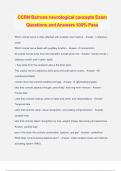
-
CCRN Barrons neurological concepts Exam Questions and Answers 100% Pass
- Exam (elaborations) • 15 pages • 2024
- Available in package deal
-
- $12.49
- + learn more
CCRN Barrons neurological concepts Exam Questions and Answers 100% Pass Which cranial nerve is often affected with a basilar skull fracture - Answer- I (olfactory)- smell Which cranial nerve deals with pupillary function - Answer- III (oculomotor) All cranial nerves arise from the brainstem except which two - Answer- cranial nerves I (olfactory-smell) and II (optic- sight) + they arise from the cerebrum above the brain stem This cranial nerve is tested by doll's eyes and cold caloric ex...
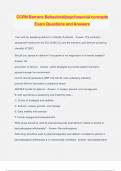
-
CCRN Barrons Behavioral/psychosocial concepts Exam Questions and Answers
- Exam (elaborations) • 3 pages • 2024
- Available in package deal
-
- $10.49
- + learn more
CCRN Barrons Behavioral/psychosocial concepts Exam Questions and Answers Two tools for assessing delirium in critically ill patients - Answer- The confusion assessment method for the ICU (CAM ICU) and the intensive care delirium screening checklist (ICDSC) Should you assess for delirium if the patient is not responsive or is heavily sedated? - Answer- No prevention of delirium - Answer- utilize strategies to promote patient orientation assess/manage the environment control clinical para...
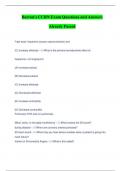
-
Barron's CCRN Exam Questions and Answers Already Passed
- Exam (elaborations) • 21 pages • 2024
-
- $14.49
- + learn more
"high dose" dopamine causes vasoconstriction and (C) Increase afterload - What is the primary hemodynamic effect of: Dopamine >10 mcg/kg/min (A) Increase preload (B) Decrease preload (C) Increase afterload (D) Decreased afterload (E) Increase contractility (D) Decrease contractility Pulmonary HTN and cor pulmonale; Mitral, aortic, or tricuspid insufficiency - What causes the S3 sound? during diastole - When are coronary arteries perfused? S3 heart sound - What may you hear befo...
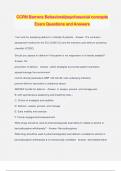
-
CCRN Barrons Behavioral/psychosocial concepts Exam Questions and Answers
- Exam (elaborations) • 3 pages • 2024
- Available in package deal
-
- $10.49
- + learn more
CCRN Barrons Behavioral/psychosocial concepts Exam Questions and Answers Two tools for assessing delirium in critically ill patients - Answer- The confusion assessment method for the ICU (CAM ICU) and the intensive care delirium screening checklist (ICDSC) Should you assess for delirium if the patient is not responsive or is heavily sedated? - Answer- No prevention of delirium - Answer- utilize strategies to promote patient orientation assess/manage the environment control clinical para...

How much did you already spend on Stuvia? Imagine there are plenty more of you out there paying for study notes, but this time YOU are the seller. Ka-ching! Discover all about earning on Stuvia


